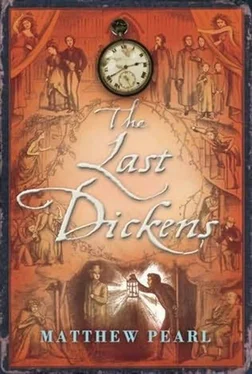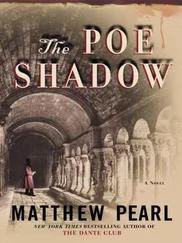Osgood thought about Dickens's popularity. People had gone to church to pray for Little Nell, they had cried for Paul Dombey as though for their own son, they cheered-how they cheered at Tremont Temple-when Tiny Tim was saved. His books became real for everyone who read them, whether the humble laborer in the Strand or the patrician in Mayfair. That is why even those who never in their life read any novels, would read his.
Their carriage slowly mounted a steep green hill to the summit where there stood an inviting white building bathed in rustic summer charm. The faded sign of the house was painted with Shakespeare's obese character of jolly Falstaff with Prince Hal, and a scene of Falstaff stuck inside a laundry basket while the Merry Wives laughed. The inn was located on rolling meadows directly opposite from the wooden entrance gates to the grand Dickens estate, known by the name Gadshill Place.
They were greeted on the steps by the landlord of the inn, whose appearance made them stop in their tracks. Solidly built, though not quite fat, he was dressed in large, brightly colored Elizabethan garments padded for good measure. His puffed-up velvet cap carried a small bird's worth of wilted feathers. He said to call him either Falstaff or “Sir John” and held a goblet of beer ready to toast any trifle in his sights.
“You may eat us out of house and home and still be welcome,” he said. “That is the motto of the Falstaff Inn!”
“I wonder if all English landlords wear such costumes,” Rebecca whispered to Osgood as the landlord and a lad transported their trunks.
“Come, Sir Falstaff will show you to your rooms!” exclaimed the merry landlord.
The next morning, John Forster, having received word of their arrival, met them in the coffee room while they recovered from their Atlantic voyage over eggs, broiled ham, and coffee. Though wearing an expensively tailored suit of the London style, Forster was himself a more genuine Falstaffian figure, with a globular body, slow movements, and the face of a spoiled child. Unlike the innkeeper there was no gaiety about this Falstaff.
“And this would be Mrs. Osgood?” Forster asked, extending his hand.
Osgood rushed to correct him, explaining her position as bookkeeper.
“Ah, I see,” Forster replied gravely, removing his hand from hers hastily and then sitting at the table. “Then you are in mourning for a husband,” he declared oracularly of her dark outfit.
“For my brother, actually, sir. My brother Daniel.”
Forster knit his brow in consternation, not at the potential of embarrassing the young lady but at his being wrong twice. “Hail to America, I suppose, to have blushing young girls trail along at your side as bookkeepers! A fine thing, that.”
At this point, one of the waiters came over and whispered into Forster's ear, “That's against the rules in the coffee room, sir.”
Forster took the cigar he was half smoking and half chewing out of his mouth and looked at it as if he had never seen it before. Then he rose to his feet and shouted, “Leave the room, rascal! How dare you, sir, interfere with me! Clear out, and bring this gentleman and lady some cakes with their breakfasts!” With the waiter taking flight, the visitor resumed his place.
“No cakes for me, though, Mr. Osgood, as I have already breakfasted, thank you,” Forster said, without having been offered any. “I wake at five every morning before even my footboy for taking your morning meal at once aids the labors of digestion and staves off sickness. Now, on to the little matter of your business, shall we?”
After Osgood explained their wish to examine Dickens's private belongings, Forster curtly said he would return to Gadshill and discuss the matter with its residents. He returned across the road to the Dickens estate shortly thereafter. An hour later, Osgood and Rebecca received a note on black-bordered mourning paper that they were welcome to Gadshill at their convenience.
“Perhaps I should stay here at the inn,” Rebecca suggested as she finished writing a note back accepting the offer. “Mr. Forster seemed rather, well, ungenial toward me.”
Osgood did not want to make her self-conscious, though she was correct. “He is ungenial in general. Remember, he was one of Mr. Dickens's closest friends. His spirits cannot be whole, after such a loss,” he said. “Come, Miss Sand. With a bit of luck we may secure our information and have some leisure time to do something very English around London, too, before we leave.”
On the outside, the redbrick Dickens family home was austere but still welcoming-stone steps leading up to a spacious portico where the large clan would once have gathered. Towering oaks formed the boundaries around the property where boys used to run and play, which gave way to wilderness beyond the gardens and now-empty cricket fields that the master of the house had made available to the townspeople for matches.
Walking through the fields felt like a walk through the legends of the novelist's life. Charles Dickens had written about first seeing the house when he was a very young child but still old enough to be aware of how poor his own family was. Before his troubles with debt that brought him to prison, John Dickens would take his queer small boy to look at Gadshill from the street. If you were to be persevering and work hard, and mind the study of your books, you might some day come to live in it , he'd say to the boy, though the father himself was not persevering and never worked hard.
Two big Newfoundland dogs, a mastiff, and a St. Bernard raced around from the side of the house. A tinge of disappointment seemed to pass through each animal's body upon seeing Osgood and Rebecca. One canine in particular, the largest among them, tilted his handsome head slowly with a devastated air that was heartbreaking. The head gardener called out and the dogs bounded as a pack back to the stable yard, then listlessly tiptoed into a cool tunnel, which led to the other side of the road.
Considerably less life awaited them inside Gadshill. The house, in fact, was being drained of it before their eyes. Some workmen were removing paintings and sculptures from the walls and tables; other somber-faced intruders in silk vests and linen suits were examining the furniture and prodding each object and fixture. The atmosphere was completed by a melancholy rendition of Chopin on piano floating on the air.
A workman lifted an oval portrait of a little girl as Forster led Osgood and Rebecca through the entrance hall to the threshold of the drawing room.
“You cannot visit Gadshill,” he suddenly announced with a gouty frown that was even less friendly than his demeanor at breakfast.
“What do you mean, Mr. Forster?” Osgood asked.
“Do you not see it with your own eyes, Mr. Osgood? Gadshill is no more-not how it was. A blasted auction of his possessions takes place next week and they are dismantling everything in sight,” Forster said, angrily waving his arms. Then he turned and cast a hard gaze at the better dressed invaders. “These other men, who are arranging the remains of the place with artificial homeyness, are the representatives of a different auction firm that will sell the very house you stand in to the high bidder. In tol -er-able, every bit!” Whenever the executor spoke, it was as if he had memorized the words beforehand, and now were reciting them to an investigating commission set to put an old enemy out of public office.
“Must every single thing in the house be sold, Mr. Forster?” Rebecca asked with genuine sadness.
“Don't tell me , young lady! Absolutely everything to the last doornail, don't I know it!” Forster cried out accusingly, as if Rebecca herself had just decreed the destiny of the place. “The Dickens family is very large,” his voice dampened into a loud whisper, “and his many sons, like him in no aspect but his name, lead expensive, wasteful lives. Of his two daughters, one is married to an invalid painter who is Wilkie Collins's brother-which is worst, I don't know, to paint, or to be crippled, or have Wilkie Collins as a relative? The other girl, though passing comely, has never married. No, without the income of future books, Gadshill cannot stay as it was.” He looked out over the meadows outside and waited for Osgood and Rebecca to do the same before continuing. “The land out there shall be remembered for three things. First, for Sir Falstaff robbing travelers with Prince Harry and the local vagabonds. Second, for Chaucer's pilgrims who passed along the way to Canterbury. And, third, for the most popular novelist that ever lived. Of the first item, your buffoon of an inn keeper has made a mockery already for the sake of profit. I shall always say ‘William,’ the man's rightful Christian name, if only to gall him. Pray there not come a day where some cheap landlord dress like one of Mr. Dickens's characters, or I should as soon have my eyes torn out by the old raven Mr. Dickens used to keep as his pet.”
Читать дальше












